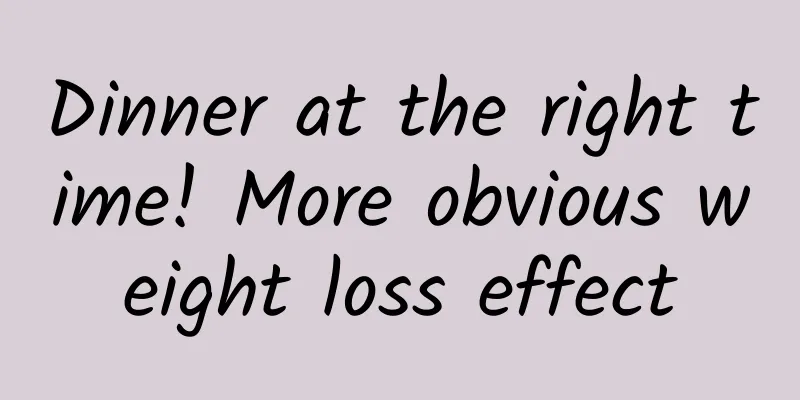Dinner at the right time! More obvious weight loss effect

|
Dinner plays a key role in weight loss. The best way to eat dinner for weight loss is to eat it three hours before going to bed. It is best to eat 80% of the day's calories in breakfast and lunch, and dinner only accounts for 20%. 1. Eat dinner three hours before bedtime After food enters the human body, the parasympathetic nerves become active, allowing the stomach and intestines to move in a relaxed state. Therefore, if we can take advantage of the fact that the parasympathetic nervous system is still active and allow the body to completely relax and fall asleep, we can improve our sleep quality. The best time to eat dinner is three hours before bedtime. When we enter a deep sleep state, the brain secretes leptin (which makes people not feel hungry) and growth hormone (which breaks down fat), both of which can help lose weight. 2. Disadvantages of eating dinner too early You must eat dinner early. If you eat too late, your stomach and intestines will not be able to digest the food completely, and calories will accumulate in the body, which is bad for your health. In fact, from the perspective of the operation mode of the autonomic nervous system, this statement is wrong. The parasympathetic nervous system can only function at its best when the body is relaxed and resting, allowing the stomach and intestines to digest food well. This is why sleep is the best time to digest food. In addition, dinner time should be adjusted according to personal schedule, instead of eating dinner early and then having more midnight snacks, which will put a burden on the body. 3. Increase protein intake at dinner Most people believe that obesity is caused by eating too much, but you may not know that losing weight can also be achieved by eating too much. Increase the protein intake in your daily dinner as it can help the body grow muscle and increase fat. A small amount of protein plus carbohydrates will produce tryptophan. This substance can improve sleep quality after entering the brain, and getting a good night's sleep is the first step to successful weight loss. 4. It’s OK to have a midnight snack occasionally Wanting to eat midnight snacks but not being able to eat them is the feeling of most people who are trying to lose weight. However, this psychological state actually intensifies our desire to eat, causing us to consume more calories. Therefore, as long as you eat the right midnight snacks, eating in moderation can actually help improve weight loss results, but this does not mean you can eat and drink without limits. The first step to not let midnight snacks become a burden on weight loss is to include midnight snacks in the calculation of daily calories; in addition, the calories of midnight snacks should be controlled within 300 calories as much as possible, because midnight snacks are used to comfort and help you sleep, not to let you eat to your heart’s content! 5. Research suggests that dinner is best for weight loss when it only accounts for 20% of your meal Fat storage is different during the day and at night, and it occurs first at night. If a person consumes 2,000 calories of food at one time in the morning, it will have little effect on his weight. However, if he consumes the same amount of food at night, his weight will increase significantly. Scientists once conducted a study on 160 women with an average weight of 85 kg, a daily calorie intake of 2,000 calories, and total calories distributed among three meals as 10% for breakfast, 45% for lunch, and 45% for dinner. The women were put on a new eating schedule for a six-month period and their total daily calories were redistributed. Breakfast accounts for 30% of calories, which should be eaten between 7 and 9 in the morning. Lunch is between 12 and 14 o'clock, accounting for 50% of calories. Another snack is eaten at 4 o'clock in the afternoon, providing 20% of the total day's calories. Between this snack and the next day's breakfast, only unsweetened beverages such as tea and coffee can be consumed. The total calories for the day are still 2000 calories. The results showed that without changing their calorie intake, more than 70% of obese women achieved a 15% weight loss. Scientists have also found that obesity is most common in Mediterranean countries, with about 30% of women and 16% of men suffering from obesity. This is related to the long days and short nights, and the relatively delayed breakfast and dinner times. Eating dinner too late is a major cause of obesity. The mechanism is that the excitability of the human body's vagus nerve is higher at night than during the day. The excitation of the vagus nerve can promote the secretion of a large amount of insulin. The excess calories are synthesized into fat in large quantities under the action of insulin, thus making people fat. Therefore, scientifically adjusting meal times is more helpful for weight loss than strict dieting. If you want to lose weight, you might as well eat 80% of your daily calories at breakfast and lunch, and only 20% at dinner. In this way, the weight loss effect will be more obvious, and this method of weight loss will not bring any side effects. Of course, this way of losing weight by eating less at dinner is a bit difficult for many people who often socialize at night. Therefore, without increasing or decreasing the calorie intake, people can achieve good weight loss results by simply adjusting their meal times appropriately and scientifically distributing the daily calorie intake. Here are some tips for controlling your food intake: 1. Using transparent containers to hold food can help prevent overeating. 2. Under the premise of the same volume, it is better to use slender and tall containers to hold food than short and thick containers. The former can help people control their food intake and reduce calorie intake. 3. Placing food in places far away from daily living and working places such as the kitchen, refrigerator, and food cabinet helps control appetite. 4. When purchasing food, avoid buying too much at one time to avoid a "stacking" effect. Because when people see a lot of food, they want to eat it as quickly as possible. 5. Intentionally create a monotonous and orderly visual effect to avoid the "grocery store" effect. Experiments have shown that monotonous food colors can limit people's appetite when they eat. In addition, it is better to arrange different foods in an orderly manner according to categories rather than mixing them together. 6. When dining in a restaurant, don't let the cleverly crafted names of dishes on the menu raise your expectations. Because excessive expectations will create a preconceived effect, thus laying the groundwork for the subsequent "feast". Food suitable for dinner ◆Appropriate amount of staple food. ◆Foods rich in high-quality protein: fish, shrimp, lean meat, and bean products. ◆Eat more green leafy vegetables. ◆Eat porridge or soup in moderation. Foods not suitable for dinner time ◆Various fried foods: fried fish, fried chicken, fried meat. ◆High-fat and high-cholesterol foods: animal offal and fatty meat. ◆High-energy food: cream cake. Source: 39 Health Network www.39.net Please do not reprint without written authorization |
<<: Black fungus diet recipes to detoxify and get a good figure
>>: 10 tips! Summer easy slim belly
Recommend
Why do I feel weak after abortion?
Artificial abortion refers to artificial abortion...
Is moderate cervical erosion easy to cure? Complete list of treatments for female cervical erosion
We all know that cervical erosion is divided into...
What ointment is used for gynecological vulvar leukoplakia? What are the external medicines for gynecological leukoplakia?
Gynecological vulvar leukoplakia is a common gyne...
Can’t control your appetite? Study: E. coli can help
"Cell Metabolism" published a study by ...
Coffee: Pregnant women who drink coffee are more likely to have miscarriages and their fetuses may be deformed
Canadian researchers recently found that caffeine...
These three soups are very attractive. Drinking them before menstruation will make menstrual blood flow more smoothly.
Many women feel very painful during menstruation,...
Jolie's secret to losing weight: Eat small meals frequently and don't go hungry
Hollywood actress Angelina Jolie, who recently be...
Age of menopause
Under normal circumstances, women's menstruat...
[Video version] Are mangoes poisonous? Should we eat less of them? 3 points to pay attention to without burden! Nutritionists explain where the “poison” comes from…
What kind of fruit ice do you want to eat most in...
Hairy crabs arrive at Taichung City Health Bureau for random inspection
After the Mid-Autumn Festival, it is the best tim...
Breakfast anti-aging health technique Wu Mingzhu: drink red dates and black fungus soup
Regardless of gender, age or status, if you want ...
Zeppelin promotes food education: Friendly farming methods make "ugly vegetables" just as nutritious!
Ambitions unfulfilled! It is a pity that Chi Peil...
Repeated abortions are more likely to cause ectopic pregnancy in women
Due to various reasons, problems occurred during ...
How much does an abortion cost? How much does a painless abortion cost?
Since the couple did not plan to have children, t...
What are the treatments for patients with cervical erosion?
Excessive vaginal cleaning or multiple abortions ...









